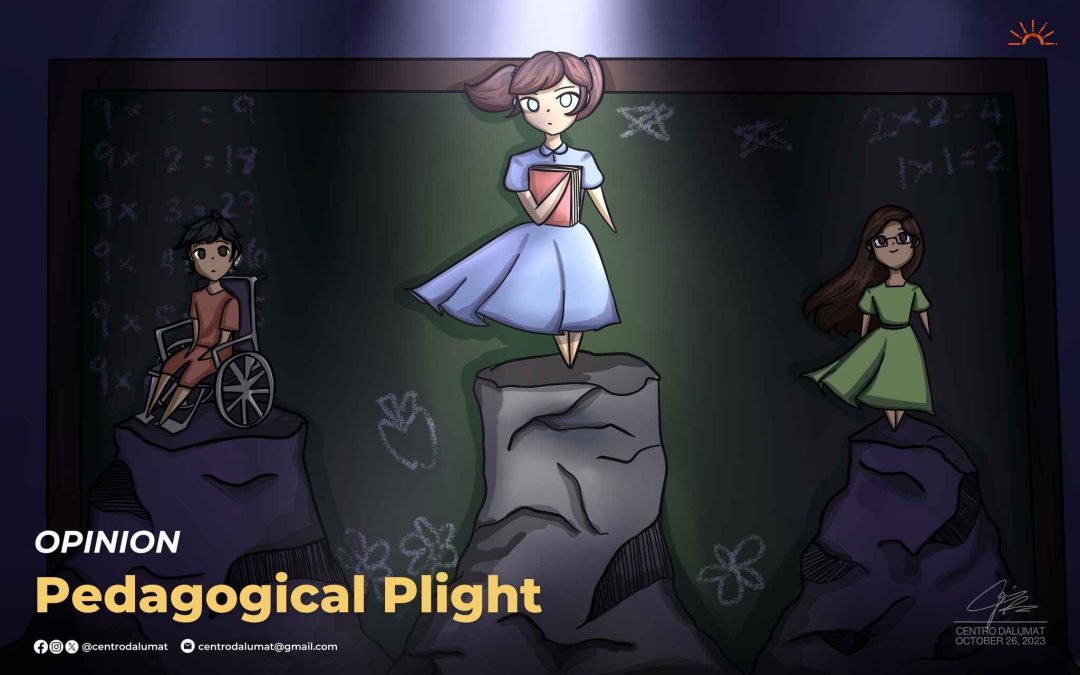Children are the future of the world, we often say. But how are they to become the catalysts of transformation and forward progression if they lack a fundamental element? How do we expect children to become productive, contributing members of society if we fail to give them an avenue to learn how to do so? Education is a right, and access to it should not be conditional. However, in this day and age, one can argue that it is becoming a privilege that only a selected few get access to.
Each child in the world is different – they are all unique in their ways. There are children more adept in numbers and sciences, while some thrive in their creativity. Some children require extra depth of guidance and mentorship in their learning. Worldwide, approximately 240 million children live with disabilities, and an estimated 1.6 million Filipinos experience the same in the Philippines. These are the number of young minds that yearn to be nurtured with intelligence. These figures represent the children entitled to quality, competent education from birth. Unfortunately, the same number of children do not get enough attention for their special needs in education.
It’s undeniable that, compared to other nations, the Philippines imposes the strictest eligibility criteria for school admissions or securing employment following formal education. Nonetheless, we are a nation that denies children with disabilities the chance to receive an education and the assurance that they can secure employment in the future.
On March 11, 2022, hope shone through the horizon when former Philippine President Rodrigo Roa Duterte signed the Republic Act No. 11650, also known as the Instituting a Policy of Inclusion and Services for Learners with Disabilities in Support of Inclusive Education Act, with the noble intention to provide carefully and expertly tailored education for children with disabilities, taking into account their individual requirements and fostering inclusivity in both education and society. The signing of this law marked a promising start for the Special Education (SPED) Program and was an answered prayer for parents of disabled children in the country. However, their happiness was quickly replaced with yet another pang of disappointment when news broke that there was zero budget allocated to support the program’s implementation. Despite a budget increase in the education sector, none was reserved for the SPED Program.
In this economy, nothing can be done without money – because cash is king – and this is the same reality we face in our education system. Without enough financial resources, advocacies and reformation attempts in special needs education will be nothing more than wishful thinking.
Of course, we acknowledge and give credit to our local government for their endeavors in restoring the right to education for every child in the country. However, the promise of the premise was unfulfilled, and accountability is long due. Strides made in promoting inclusive education are only as effective as their implementation.
The signing of the law was an empty ultimatum. No concrete action followed through with guaranteeing an inclusive and proficient education for children with special needs. Although many teachers and teacher organizations are eager to contribute meaningfully and are tirelessly advocating for special needs education, all these would reach a dead end if there is still a lack of a holistic approach to training and equipping teachers for special needs education. Up to this day, the ratio of SPED teachers to the volume of children requiring special education remains to have a large gap. There are only thousands of SPED teachers, but millions of children require their professionalism. The caliber of instruction at SPED institutions typically falls short of expectations because, sadly, they are understaffed and underfunded, making it difficult for them to provide the specific support and resources needed for children with various needs. Existing SPED instructors struggle to adequately meet the needs of their students due to insufficient training and professional development because there is a dearth of skilled teachers. If these problems are left unchecked, they can hinder a special needs student from learning and developing since teachers are unable to make the necessary adjustments to cater to their needs.
Moreover, the lack of accessibility is another problem facing SPED. Establishing facilities requires, well, money — something the SPED program lacks. Because of this, a great number of kids with impairments are once again denied space to fulfill their entitlement to a good education.
Furthermore, there is a general lack of knowledge and comprehension of the breadth of children’s learning deficiencies. The lack of awareness about their condition can prevent them from learning and potentially harm their holistic and intellectual development. It is difficult for children with disabilities to integrate into mainstream school environments and society at large because of this misinformation, which creates discrimination and prejudice.
“𝘐𝘯𝘤𝘭𝘶𝘴𝘪𝘷𝘦 𝘦𝘥𝘶𝘤𝘢𝘵𝘪𝘰𝘯 𝘴𝘩𝘰𝘶𝘭𝘥 𝘯𝘰𝘵 𝘰𝘯𝘭𝘺 𝘣𝘦 𝘢𝘱𝘱𝘭𝘪𝘦𝘥 𝘵𝘰 𝘴𝘵𝘶𝘥𝘦𝘯𝘵𝘴 𝘸𝘪𝘵𝘩 𝘥𝘪𝘴𝘢𝘣𝘪𝘭𝘪𝘵𝘪𝘦𝘴. 𝘎𝘰𝘯𝘦 𝘢𝘳𝘦 𝘵𝘩𝘦 𝘥𝘢𝘺𝘴 𝘸𝘩𝘦𝘯 𝘸𝘦 𝘱𝘶𝘵 𝘵𝘺𝘱𝘪𝘤𝘢𝘭𝘭𝘺 𝘥𝘦𝘷𝘦𝘭𝘰𝘱𝘪𝘯𝘨 𝘴𝘵𝘶𝘥𝘦𝘯𝘵𝘴 𝘪𝘯 𝘢 𝘣𝘰𝘹, 𝘦𝘹𝘱𝘦𝘤𝘵𝘪𝘯𝘨 𝘵𝘩𝘦𝘮 𝘵𝘰 𝘭𝘦𝘢𝘳𝘯 𝘢𝘯𝘥 𝘵𝘩𝘪𝘯𝘬 𝘵𝘩𝘦 𝘴𝘢𝘮𝘦 𝘸𝘢𝘺, 𝘮𝘢𝘬𝘪𝘯𝘨 𝘭𝘦𝘢𝘳𝘯𝘪𝘯𝘨 𝘪𝘯𝘦𝘧𝘧𝘦𝘤𝘵𝘪𝘷𝘦,” the inclusive education system should include SPED as a crucial component rather than seeing it as a distinct and independent entity, according to a third-year Escolarian majoring in Special Needs Education. “𝘈𝘴 𝘚𝘗𝘌𝘋 𝘵𝘦𝘢𝘤𝘩𝘦𝘳𝘴, 𝘰𝘶𝘳 𝘮𝘢𝘪𝘯 𝘨𝘰𝘢𝘭 𝘪𝘴 𝘵𝘰 𝘮𝘢𝘬𝘦 𝘴𝘵𝘶𝘥𝘦𝘯𝘵𝘴 𝘸𝘩𝘰 𝘮𝘢𝘺 𝘣𝘦 𝘭𝘢𝘣𝘦𝘭𝘦𝘥 𝘢𝘴 𝘥𝘪𝘧𝘧𝘦𝘳𝘦𝘯𝘵 𝘧𝘦𝘦𝘭 𝘵𝘩𝘢𝘵 𝘵𝘩𝘦𝘺 𝘢𝘳𝘦 𝘱𝘢𝘳𝘵 𝘰𝘧 𝘢 𝘤𝘰𝘮𝘮𝘶𝘯𝘪𝘵𝘺 𝘢𝘯𝘥 𝘵𝘩𝘢𝘵 𝘵𝘩𝘦𝘺 𝘩𝘢𝘷𝘦 𝘵𝘩𝘦 𝘳𝘪𝘨𝘩𝘵 𝘵𝘰 𝘩𝘢𝘷𝘦 𝘢𝘤𝘤𝘦𝘴𝘴 𝘵𝘰 𝘲𝘶𝘢𝘭𝘪𝘵𝘺 𝘦𝘥𝘶𝘤𝘢𝘵𝘪𝘰𝘯 𝘳𝘦𝘨𝘢𝘳𝘥𝘭𝘦𝘴𝘴 𝘰𝘧 𝘵𝘩𝘦𝘪𝘳 𝘥𝘪𝘷𝘦𝘳𝘴𝘦 𝘤𝘩𝘢𝘳𝘢𝘤𝘵𝘦𝘳𝘪𝘴𝘵𝘪𝘤𝘴.”
The SPED Program can only truly serve its purpose if (1) the government allocates more resources for adequately staffed and well-equipped centers, (2) invests in teacher training for SPED educators with an emphasis on teaching strategies for children with disabilities, (3) establishes accessible SPED learning centers, (4) increase public awareness to combat misinformation and discrimination, (5) offer support and provide resources to empower both special needs children and their families, and (6) endow in research for better understanding and progress within the education system of the Philippines.
As you can see, these are serious problems in need of immediate resolution. “𝘛𝘩𝘦𝘴𝘦 𝘤𝘩𝘪𝘭𝘥𝘳𝘦𝘯 𝘸𝘪𝘭𝘭 𝘩𝘢𝘷𝘦 𝘢 𝘩𝘢𝘳𝘥 𝘵𝘪𝘮𝘦 𝘨𝘳𝘰𝘸𝘪𝘯𝘨, 𝘢𝘤𝘩𝘪𝘦𝘷𝘪𝘯𝘨 𝘵𝘩𝘦𝘪𝘳 𝘧𝘶𝘭𝘭 𝘱𝘰𝘵𝘦𝘯𝘵𝘪𝘢𝘭, 𝘢𝘯𝘥 𝘣𝘦𝘤𝘰𝘮𝘪𝘯𝘨 𝘴𝘦𝘭𝘧-𝘴𝘶𝘧𝘧𝘪𝘤𝘪𝘦𝘯𝘵 𝘦𝘯𝘰𝘶𝘨𝘩 𝘵𝘰 𝘤𝘰𝘯𝘵𝘳𝘪𝘣𝘶𝘵𝘦 𝘵𝘰 𝘴𝘰𝘤𝘪𝘦𝘵𝘺. 𝘛𝘩𝘦 𝘦𝘧𝘧𝘰𝘳𝘵𝘴 𝘰𝘧 𝘱𝘢𝘳𝘦𝘯𝘵𝘴, 𝘵𝘦𝘢𝘤𝘩𝘦𝘳𝘴, 𝘰𝘳 𝘰𝘵𝘩𝘦𝘳 𝘴𝘵𝘢𝘬𝘦𝘩𝘰𝘭𝘥𝘦𝘳𝘴 𝘮𝘢𝘺 𝘯𝘰𝘵 𝘢𝘭𝘸𝘢𝘺𝘴 𝘣𝘦 𝘴𝘶𝘧𝘧𝘪𝘤𝘪𝘦𝘯𝘵 𝘵𝘰 𝘢𝘥𝘥𝘳𝘦𝘴𝘴 𝘵𝘩𝘦𝘴𝘦 𝘤𝘩𝘪𝘭𝘥𝘳𝘦𝘯’𝘴 𝘯𝘦𝘦𝘥𝘴, 𝘵𝘩𝘶𝘴 𝘪𝘵 𝘪𝘴 𝘩𝘰𝘱𝘦𝘥 𝘵𝘩𝘢𝘵 𝘱𝘦𝘰𝘱𝘭𝘦 𝘪𝘯 𝘱𝘰𝘴𝘪𝘵𝘪𝘰𝘯𝘴 𝘰𝘧 𝘮𝘰𝘳𝘦 𝘢𝘶𝘵𝘩𝘰𝘳𝘪𝘵𝘺 𝘸𝘪𝘭𝘭 𝘥𝘰 𝘵𝘩𝘦𝘪𝘳 𝘱𝘢𝘳𝘵 𝘢𝘯𝘥 𝘱𝘢𝘺 𝘮𝘰𝘳𝘦 𝘢𝘵𝘵𝘦𝘯𝘵𝘪𝘰𝘯 𝘵𝘰 𝘵𝘩𝘦𝘮.”
Some of you may be thinking at this point, “𝘈𝘯𝘥𝘢𝘮𝘪 𝘯𝘢𝘮𝘢𝘯𝘨 𝘴𝘪𝘯𝘢𝘴𝘢𝘣𝘪 𝘯𝘪𝘵𝘰! 𝘉𝘢𝘬𝘪𝘵 𝘩𝘪𝘯𝘥𝘪 𝘪𝘬𝘢𝘸 𝘮𝘢𝘨𝘪𝘯𝘨 𝘚𝘦𝘤𝘳𝘦𝘵𝘢𝘳𝘺 𝘰𝘧 𝘌𝘥𝘶𝘤𝘢𝘵𝘪𝘰𝘯 𝘵𝘶𝘵𝘢𝘭 𝘮𝘢𝘳𝘢𝘮𝘪 𝘬𝘢𝘯𝘨 𝘢𝘭𝘢𝘮!” If only I am qualified enough, I definitely will take you up on the challenge. But since I can only do so much with the power and resources at my disposal, I offer you this piece in hopes of making it known that our education system tends to be problematic and is in dire need of reformation. This is not just a matter of reformation but a matter of social justice and human rights. The Philippine education system demands so much and so highly from students and teachers alike, but the system itself cannot even answer our heed for accountability with its shortcomings.
Every child has the potential to become a great leader and a skilled professional contributing to our society. Still, we cannot expect children to become so if we fail to fulfill our obligation to ensure that they are given the space, the tools, and the opportunities to do so.
Written by Lexine Cruz
Illustration by Jamie Cruz
REFERENCES
- lagasca, Tom. (2023). FF2023-17: Special Education (SPED) Profile in the Philippines. Congress.gov.ph. https://cpbrd.congress.gov.ph/2012-06-30-13-06-51/2012-06-30-13-36-50/1604-ff2023-17-special-education-sped-profile-in-the-philippines
- Kurt Dela Peña. (2023, March). Zero budget for special education in 2023 makes SPED law “meaningless.” INQUIRER.net; INQUIRER.net. https://newsinfo.inquirer.net/1674980/zero-budget-for-special-education-in-2023-makes-sped-law-meaningless
- Wood, Gavin; Whittaker, Golnaz (2022). Assistive Technology in Humanitarian Settings: Overview of Research Project, Innocenti Research Report, UNICEF Office of Research – Innocenti, Florence

